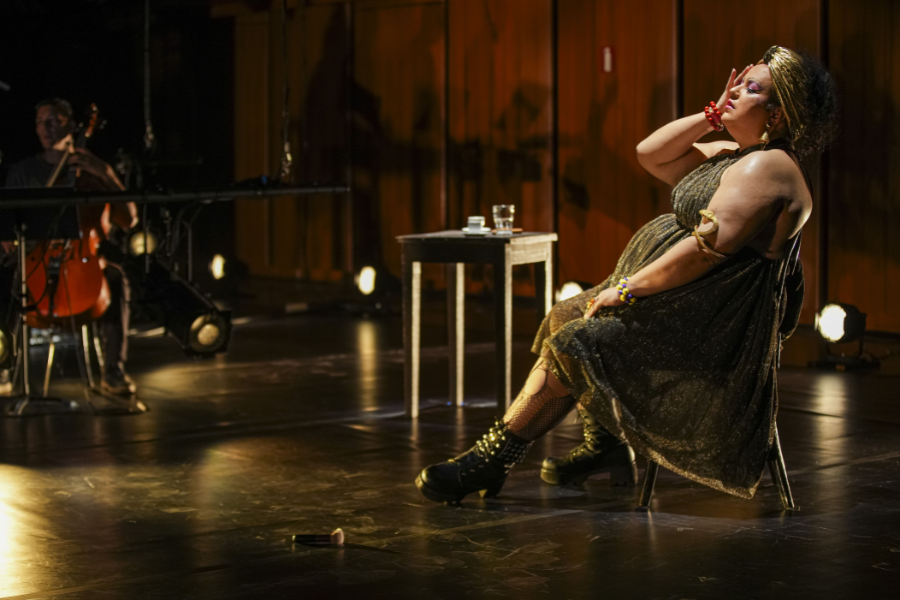João Ripper en el Amazonas

Entrevista al destacado director, compositor y gestor cultural que este 27 de mayo estrena su ópera Kawah Ijen (O vulcão azul) en el XXI Festival Amazonas de Ópera de Manaos.
.
Kawah Ijen (O vulcão azul) es una obra inédita, encomendada por el Festival Amazonas de Ópera. La historia ocurre a los alrededores del volcán Kawah Ijen, en Indonesia, donde el dueño de una minera enriquece desde hace años a costa de la explotación de los habitantes de la villa. A causa de llegar hasta las profundidades del cráter para recoger las mejores piedras de azufre, los jóvenes mineros perecen al inhalar el gas venenoso. Gracias al pacto con la divinidad del volcán, el dueño está protegido de las constantes revueltas y amenazas del pueblo. Sin embargo, todo cambia cuando él codicia y violenta a una joven de la villa que dará a luz a aquel que cambiará el destino de todos y del propio volcán Kawah Ijen (O vulcão azul) llega al Teatro Amazonas de Manaus, bajo la dirección del maestro Marcelo de Jesús y dirección escénica de William Pereira. Es ambientada en Indonesia y es la primera ópera a incorporar el Gamelán en la orquestación. La Embajada de la Indonesia en Brasil hice fabricar el instrumento especialmente para la ocasión y lo donó al Teatro Amazonas.
.
¿De dónde surge la inspiración para componer Kawah Ijen? ¿Cómo comienza a trabajar en ella?
En 2016, durante la temporada de ópera Onheama en Portugal, Elizabeth Davis, la percusionista de la orquesta del Teatro Nacional San Carlos y experta en Gamelan, me trajo el argumento de El Dios del volcán, escrito por Fernando Barata. La historia se desarrolla en Yakarta, en los alrededores del volcán Kawah Ijen, que expulsa lava azulada debido a la gran concentración de azufre.
.
El Maestro Luiz Fernando Malheiro, el Director Artístico del Festival Amazonas de Ópera, dio el paso decisivo al hacer de Kawah Ijen un encargo para la edición de este año. Comencé a trabajar sobre el libreto y a investigar sobre el Gamelán, que tanto fascinó a Debussy a finales del siglo XIX. Estructuré y escribí el libreto de la ópera en tres actos con escenas ligadas por interludios instrumentales. Cuando presenté el proyecto a Toto Riyanto, Embajador de Indonesia, él mandó fabricar en Yogyakarta un Gamelán con temperamento occidental para ser utilizado con la orquesta y trajo las marionetas del Wayang (teatro de sombras) que se realiza en el segundo acto. El Gamelán fué donado al Teatro Amazonas que ahora cuenta con el único instrumento del género en Brasil y, quizás, en la América del Sur.
.
¿Qué importancia le da usted a la creación y puesta en escena de nuevos trabajos o repertorios nuevos?
La renovación del repertorio es fundamental para el futuro del género. El público latinoamericano tiende a ser menos conservador que el europeo y, por eso, nuestros teatros tienen más posibilidades de encargar y producir nuevos títulos, crear formatos inéditos de presentación y abrir caminos para la industria de la ópera. Además, a la renovación del repertorio se podría añadir programas de acción social a través de la música que se extienden por el continente. La ópera es un excelente medio de capacitación profesional en sus diversas competencias necesarias a las etapas de creación, producción y realización.
.
¿Por qué estrenar en el Festival Amazonas? ¿Qué importancia le otorga a esta clase de eventos en Latinoamérica?
El Festival Amazonas de Ópera presenta cinco títulos en el transcurso de dos meses, con obras del gran repertorio al lado de óperas brasileñas y latinoamericanas, algunas en estreno mundial. En el marco de su 21ª edición, el FAO es el principal evento del género en Brasil.
.
Luiz Fernando Malheiro, Director Artístico, realiza un trabajo fantástico en la conducción del evento y de los conjuntos artísticos del Teatro Amazonas. Flavia Furtado, Stage Manager y Directora Ejecutiva del Festival, es hoy un de los principales nombres brasileños en la área de gestión teatral. El Festival cuenta con el apoyo fundamental del Gobierno del Amazonas, a través de su Secretaría de Cultura. Desde su creación, además del viento renovador en la escena lírica brasileña, el festival proporcionó un gran impacto económico y social en Manaus a través del aumento de la actividad comercial, turística y de generación de empleos directos e indirectos.
Me siento en casa en el Teatro Amazonas. Me encanta la dinámica particular del festival que hace posible una convivencia más estrecha con maestros, directores, músicos de orquesta y técnicos. Onheama, estrenada en 2014, resultó del encargo que recibí del FAO para escribir una ópera sobre tema amazónico para público juvenil. Fue reposta en 2015 y recibió una nueva producción en Portugal el año siguiente. En 2016, escribí la cantata escénica Natividad para el concierto de final de año del Teatro Amazonas y, ahora, tengo la alegría de regresar con la ópera Kawah Ijen.
.
Biografía del Director
João Ripper es compositor, director de orquesta, gestor cultural y profesor de la Escuela de Música de la Universidad Federal de Río de Janeiro. Obtuvo su Doctorado en Composición en The Catholic University of the America, en Washington D.C. y se perfeccionó en regencia orquestal con el Maestro Guillermo Scarabino en Buenos Aires, y cursó “Économie et Financement de la Culture”, en la Université Paris-Dauphine. Fue director de la Escuela de Música de la UFRJ entre 1999 y 2003. En 2004 aceptó la invitación del Gobierno del Estado de Río de Janeiro para dirigir la Sala Cecília Meireles, donde permaneció por 11 años. En 2015, fue nombrado Presidente de la Fundación Teatro Municipal de Río de Janeiro, cargo que ocupó hasta 2017. Ripper es el actual Presidente de la Academia Brasileña de Música, institución fundada por Heitor Villa-Lobos en 1945 que congrega 40 compositores, intérpretes y musicólogos brasileños.
.
Sus recientes estrenos y futuras producciones incluyen Onheama, Domitila, Piedade, O Diletante, From My Window, Desenredo, Cinco poemas de Vinicius de Moraes, Natividade – Cantata Cênica y Gloria Concertato.





